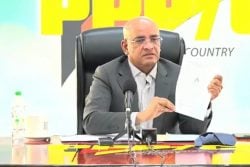BEIJING, (Reuters) – Sergey Bubka and Sebastian Coe were pressing the flesh among IAAF Congress delegates yesterday in a final push for votes ahead of Wednesday’s election for the next president of the governing body of athletics.
The doping allegations that have rocked the sport in the run-up to the 15th world championships could not fail to be a campaign issue as the two former Olympic champions go head-to-head to replace octogenarian Lamine Diack.
It is, however, by no means the only issue engaging the 214 national federations who will vote to decide which of the two track and field greats will lead the sport after 16 years under the guidance of the Senegalese.
Diack said on Monday that he was confident of the future of the IAAF under either of the “bona fide sons of the sport” after the “foundation” he had laid.
The manifestoes of the two candidates to replace him, however, suggest athletics is still struggling for profile and the cash that goes with it outside the quadrennial Summer Olympics.
Both Bubka and Coe have plans to promote the sport better, generate more revenue from sponsorship, coordinate the top level of competition into a more immediately understandable and saleable product as well as to attract a younger audience.
Coe would certainly have been talking to delegates about his role in successfully delivering the London Olympics, while Bubka can point to his stewardship of the Ukrainian Olympic Committee to illustrate his leadership credentials.
Both showed fierce competitiveness during their athletics careers — Bubka as the most dominant pole vaulter of the modern era and Coe as a champion middle distance runner — so it would be no surprise if the vote was very close.
It seems unlikely that the issue of doping will prove decisive.
Coe launched a passionate defence of the IAAF against what he described as a “declaration of war” on his sport after allegations from German broadcaster ARD/WRD and the Sunday Times that blood doping was rampant in athletics.





